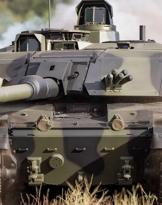The Russians are supposed to send troops from the same brigade that helped to annex the Crimea to Syria. The decision, if confirmed, would make sense: Moscow would have opted for troops ready for combat. These also include completely autonomous unit.
The Kremlin has not confirmed (nor denied) the displacement of the units in Syria. It would still be an almost obligatory choice.
Last year Moscow spent enormous resources to amass troops in the Crimea and Ukraine, but the military strengthening in Syria suggests that Putin decided to fight the Islamic state with its own rules.
Officially, Moscow has deployed military technicians and experts in Syria, but continues to strengthen its military presence in the western coastal province of Latakia. The logistical sense of this deployment is justified by the fact that the Eastern Mediterranean is the responsibility of the Black Sea War Fleet.
Putin, by now appears evident, will do everything possible not to lose his influence in Syria through the Assad government and the unique eastern base in the Mediterranean. The Tartus naval base on the Mediterranean coast of Syria is the only Russian outpost in the region after the collapse of the Soviet Union.

Sand the Damascus government should fall, Russia would almost certainly lose its rights on the base. And the West should also review recent history. Putin deployed troops and missiles to preserve the Sevastopol naval base, which houses the Black Sea War Fleet command. Crimea was turned into a fortress, with 50 S-300 missile systems, twenty mobile batteries, heavy weapons and special departments. Operating from Sevastopol, the Russians have preserved the ability to project power throughout the region.
We should understand how far Putin will want to go to protect Assad. The latest satellite photos would confirm this determination: the Russians would send armed drones and fighter planes to northern Syria. About a thousand soldiers have already been deployed to protect al-Assad International airport, south of Latakia. The deployment was necessary to ensure the airlift that continues unabated at a rate of four flights a day.
The isolation of the West against Russia, following the sanctions imposed after the Ukraine affair, has in a sense authorized Putin to act without any kind of international consensus. Indeed, precisely for the Russians, patriotic rediscovered after the Ukraine affair, Putin was the only one to align with the Syrian regime in the name of the fight against terrorism and extremism. The United States, on the other hand, would be those who would have facilitated the rise of the Islamic state with the failure of their strategy. In fact, Moscow is not part of the international coalition against ISIS.
The next step for the Russians? Simple. Piling up armor and assault helicopters, before going on to counterattack.

Finally, the absence of ISIS is curious, with its mediatic branch that has always made its voice heard in reference to international dynamics. Perhaps the Caliphate strategists have underestimated Russia. Putin will never give up his bases in Syria.
The Islamic State could find itself facing an enemy against whom it has no chance of winning. Today's Russians are not those deployed in Afghanistan. And the ISIS terrorists are not the US-supported mujaheddin. And if al-Baghdadi still maintains a minimum of self-preservation, it will be careful not to authorize any action against Russian outposts.
Putin, who has admitted to thinking of a nuclear attack to protect Crimea, could trigger "his war". And he doesn't need to ask anyone's permission.
(photo: Russian Fed. kremlin.ru)












